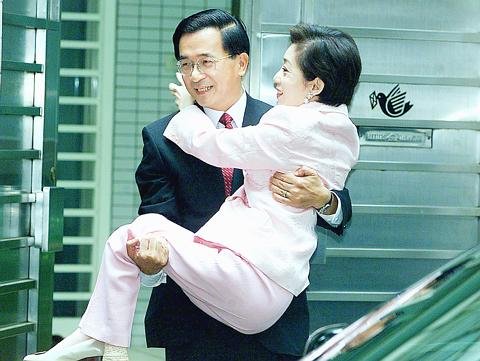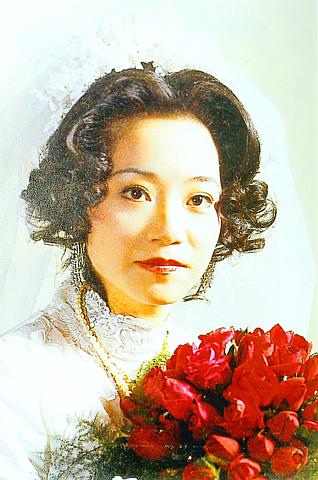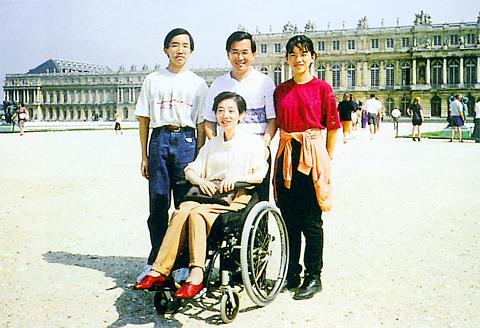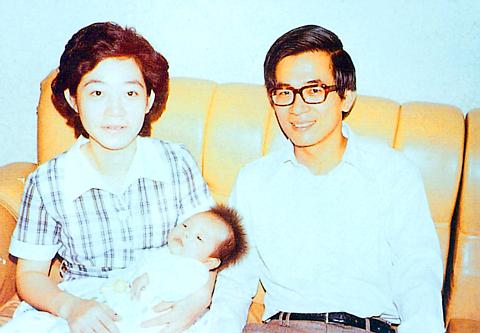President Chen Shui-bian's (
But this ordinary lifestyle cannot hide the extraordinary lives of Chen Shui-bian and Wu Shu-chen, (
Sound like an FTV melodrama? Well, it will be. At least three TV channels have or are preparing versions of Chen's story, with the first being San-lih channel's "A-bian and A-chen" (

PHOTO: REUTERS
The First Lady's early memories of Chen trace back to their school days in Tainan County. She remembers a dark, thin, small boy -- in other words, unimpressive -- from her elementary school who always earned top commendations from teachers. Many years later, during Chen's college years, Wu was still nonplussed, but nevertheless agreed to a date with the curious, bookish man with Coke-bottle glasses. During this first date, perhaps with the hope of impressing her with his academic prowess, Chen gave Wu "a tedious law textbook" as a present.
Despite such clumsiness at wining and dining, Chen had a patience and determination to be the best thing that ever happened to Wu.
In her biography, Walking Out of Silver Spoon (

She would later encounter more of the man's deep commitment to those he loved. After getting his license to practice law during his third year of university, Chen ventured into maritime law and made the beginnings of a small fortune early in his career. But he gave most of his earnings to his impoverished family and paid off the family debts. "It wasn't until that time that I realized Chen's family was in such a difficult position," she said last week.
As Chen and Wu grew closer, the latter's arrogance and stubbornness occasionally irritated Chen. "Don't take me as one of your servants," Chen once said, according to Wu. But these were also qualities that aided their decision to get married in the face of stiff resistance from her well-heeled family. "The more my father objected to this marriage the more I wanted to marry him," she said. He wanted his daughter to marry a doctor; Wu left home and married the young lawyer instead.
It was also Wu's stubbornness, combined with a strong sense of justice, that helped push Chen into the world of politics. It was Wu who persuaded Chen, at the time a successful lawyer, to join the defense team for the eight accused of inciting the Kaohsiung Incident (

PHOTO: COURTESY OF WU SHU-CHEN
In November 1974, Chen lost his bid for the Tainan County magistrate by a narrow margin. During a thank-you campaign for his supporters, Wu was walking along with the campaign staff when a truck hit her. Hardly an accident, the truck backed up to run over her two more times, leaving Wu lying on the street, blood mingling with her red dress. "I just felt sluggish all over, like I was dying, and my lower body was all numb," Wu recalled.
Although Wu survived, barely, she was paralyzed from the chest down. "I saw A-bian running back with a pale face, holding his wife, hands shivering. But Shu-chen was very calm the whole time, shedding no tears, just weakly telling Chen some important family affairs in case she could not hold onto her life," said Chen Chun-ying (
The attack was believed to be politically motivated. "I believe it was related to local factions which were affected by the election result," said Wu. But the attack, contrary to its intended purpose of scaring Chen out of politics, assured his political involvement and cemented the couple's relationship. "The more difficult the situation, the more determined he is. The more you pressure him, the stronger his reaction. So if the KMT did not push him this hard maybe we would not have today's Chen Shui-bian" she said.

PHOTO COURTESY OF WU SHU-CHEN
The three sequential misfortunes in 1974 -- an election defeat, the car attack and his later imprisonment immediately after Wu was discharged from the hospital -- became an unmitigated motivation for success. "We have been step-by-step striving to reach our goals, and in the process, we've also paid a huge price throughout the years with our involvement in politics," Wu said.
One of the sacrifices was the humiliation of a public airing of the couple's sex life. In previous elections, rumors about Chen having mistresses or prostitutes because of Wu's physical condition made for sensationalistic headlines. "As Chen Shui-bian's wife, I had to explain to the public how our sex life is," she said. And again she refuted the rumors. "With basic medical knowledge you would know there can be a sex life for a spine-injured person. And you know that for such a busy, tight-scheduled politician he [Chen] does not have so much energy for a lot of sex. So in a way we match well in this matter," she said.
Wu sometimes thinks that if not for the incident, President Chen may have had more domestic problems -- just slightly more intimate in nature. "Very often he goes to sleep immediately after coming home, because he is too exhausted from work," she said. "I'm a forthright person and I'm not scared of talking about sex. But this matter takes time and atmosphere. It's not like a James Bond movie, where you can have intimacy at any dangerous moment."
But even when they are intimate, President Chen still finds it hard to put politics second. "We talk about politics in bed," Wu conceded. "He usually proudly shows me what praises he received from media that day, or how foreign media have commented on him." And even in the middle of the night, Chen is sometimes more concerned about his political performance. "Even with only underwear on at midnight, he would sometimes get up to check poll results from the fax machine," said Wu.
However, the new president isn't always so serious. The First Lady revealed that President Chen likes to play kissing games with Honey, the "First Dog." How's that for romantic?

The 1990s were a turbulent time for the Chinese Nationalist Party’s (KMT) patronage factions. For a look at how they formed, check out the March 2 “Deep Dives.” In the boom years of the 1980s and 1990s the factions amassed fortunes from corruption, access to the levers of local government and prime access to property. They also moved into industries like construction and the gravel business, devastating river ecosystems while the governments they controlled looked the other way. By this period, the factions had largely carved out geographical feifdoms in the local jurisdictions the national KMT restrained them to. For example,

The remains of this Japanese-era trail designed to protect the camphor industry make for a scenic day-hike, a fascinating overnight hike or a challenging multi-day adventure Maolin District (茂林) in Kaohsiung is well known for beautiful roadside scenery, waterfalls, the annual butterfly migration and indigenous culture. A lesser known but worthwhile destination here lies along the very top of the valley: the Liugui Security Path (六龜警備道). This relic of the Japanese era once isolated the Maolin valley from the outside world but now serves to draw tourists in. The path originally ran for about 50km, but not all of this trail is still easily walkable. The nicest section for a simple day hike is the heavily trafficked southern section above Maolin and Wanshan (萬山) villages. Remains of

With over 100 works on display, this is Louise Bourgeois’ first solo show in Taiwan. Visitors are invited to traverse her world of love and hate, vengeance and acceptance, trauma and reconciliation. Dominating the entrance, the nine-foot-tall Crouching Spider (2003) greets visitors. The creature looms behind the glass facade, symbolic protector and gatekeeper to the intimate journey ahead. Bourgeois, best known for her giant spider sculptures, is one of the most influential artist of the twentieth century. Blending vulnerability and defiance through themes of sexuality, trauma and identity, her work reshaped the landscape of contemporary art with fearless honesty. “People are influenced by

Ten years ago, English National Ballet (ENB) premiered Akram Khan’s reimagining of Giselle. It quickly became recognized as a 21st-century masterpiece. Next month, local audiences get their chance to experience it when the company embark on a three-week tour of Taiwan. Former ENB artistic director Tamara Rojo, who commissioned the ballet, believes firmly that if ballet is to remain alive, works have to be revisited and made relevant to audiences of today. Even so, Khan was a bold choice of choreographer. While one of Britain’s foremost choreographers, he had never previously tackled a reimagining of a classical ballet, so Giselle was